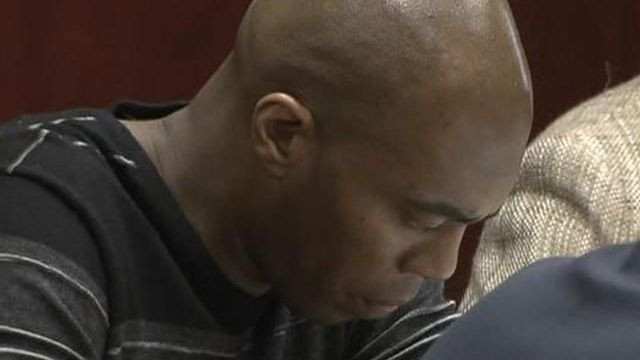Prosecutor: Cooper not a victim but 'cold-blooded killer'
Jurors must now decide whether Samuel James Cooper is guilty in the shooting deaths of five men over a 17-month period in 2006 and 2007.
Posted — UpdatedAttorneys presented closing arguments Monday morning in the trial of Samuel James Cooper, who is on trial for first-degree murder in the deaths of Ossama Haj-Hussein, 43, on May 12, 2006; LeRoy Jernigan, 41, on June 3, 2006, Timothy Barnwell, 34, on April 27, 2007; Ricky High, 48, on Oct. 12, 2007; and Tariq Hussain, 52, on Oct. 14, 2007.
Four of the killings occurred during robberies, police investigators testified during the trial. High's shooting death happened during a confrontation Cooper had with suspected Blood gang members.
"These were five men who didn't know each others – strangers," Wake County Assistant District Attorney Adam Moyers told jurors, pointing at Cooper. "But at the moment of their death, they had one thing in common and that sits at that table right there, and his name is Sam Cooper."
Garner police arrested Cooper in November 2007 following a robbery at a local Bank of America. Ballistics experts linked evidence from the homicides to a gun Cooper dropped while fleeing police following that bank robbery.
Cooper later confessed to the killings in a series of police interviews.
Defense attorneys do not deny their client's responsibility for the shootings, but have argued that he suffers from post-traumatic stress disorder and pathological dissociation because of years of abuse by his father.
Those disorders, which left Cooper absent of any emotions and in a delusional state, were factors that prompted the shootings, they have argued.
"I realize from the very beginning how difficult it is to understand this. It is an extremely difficult thing to understand," defense attorney Stephen Freedman told jurors. "We're looking at this case through our eyes. Our eyes see love and care. … It's very hard for our eyes to see a young boy being beaten unmercifully by his father while his sisters are shaking on the couch."
Cooper's mother and two sisters testified that Cooper, as the oldest child, often bore the brunt of the beatings and took a role as protector over his siblings in an effort to keep them safe from their father.
The beatings he suffered, they testified, became so severe, that at around age 12, Cooper stopped responding to the pain inflicted upon him and learned to cope with it.
"He quit feeling any pain. He quit feeling any emotion. He quit feeling at all," Freedman said. "He entered this world of nothingness and emptiness."
That lack of feeling stayed with Cooper through the rest of his life, Freedman continued.
But prosecutor Jeff Cruden told jurors that while much of the defense's argument focused on what went on inside the Cooper house, the attorneys never mentioned what might have affected Cooper's life once he left home around age 16.
Cooper spent several years in and out of prison on numerous charges. He was released three months before Haj-Hussein was killed at the In & Out Food Mart, less than a half-mile from Cooper's home.
"Fifteen years of his life (are) just wiped away like it didn't exist," Cruden said. "Or maybe because it just didn't help further the theory they put on that it's dad's fault."
The state has argued that Cooper was deliberate, knew that the crimes were wrong and went to great lengths to hide evidence that could link him to the crimes.
"This is not a case about post-traumatic stress disorder and dissociation. This is a case about choices," Cruden said. "The defendant made those choices. He has the ability to make those choices. There's no doubt."
Defense references to Cooper as "Sammy," he added, were also meant to "humanize him to look less like a monster."
"They try to make him less scary, so you won't be afraid of him," Cruden said as he projected on the courtroom wall a surveillance image moments before Hussain was killed inside Bobby's Grocery on Garner Road.
"That's not Sammy pointing that gun at (Hussain's) face," he said. "That's Sam Cooper – not only the bank robber but the killer – seconds before he put two bullets into his throat and through his chest."
Cruden also argued that there was no denying that Cooper was beaten as a child but believes the claims were embellished to paint him as a victim who grew to view the world as a "hostile, violent and dangerous place."
"You're right. It is a hostile, violent and dangerous place, and the world is such a place because of people like him," Cruden said of Cooper. "He's not the victim that they portrayed him to be. He's the person who turns people into victims. He is a cold-blooded killer."
The jury has to decide whether Cooper is guilty of first-degree murder, second-degree murder or not guilty in each of the five deaths. They must also decide if he is guilty or not guilty in the bank robbery on Nov. 22, 2007.
If he is found guilty of first-degree murder in any of the cases, the jury must also decide whether he should face the death penalty. That would come during a sentencing hearing immediately following the verdict.
"First-degree felony murder – there's no defense to this theory," Moyers said. "(There's) no defense to this theory, and there's only one possible conclusion that this jury can reach, and that is guilty beyond a reasonable doubt."
• Credits
Copyright 2024 by Capitol Broadcasting Company. All rights reserved. This material may not be published, broadcast, rewritten or redistributed.





